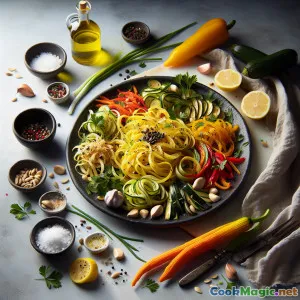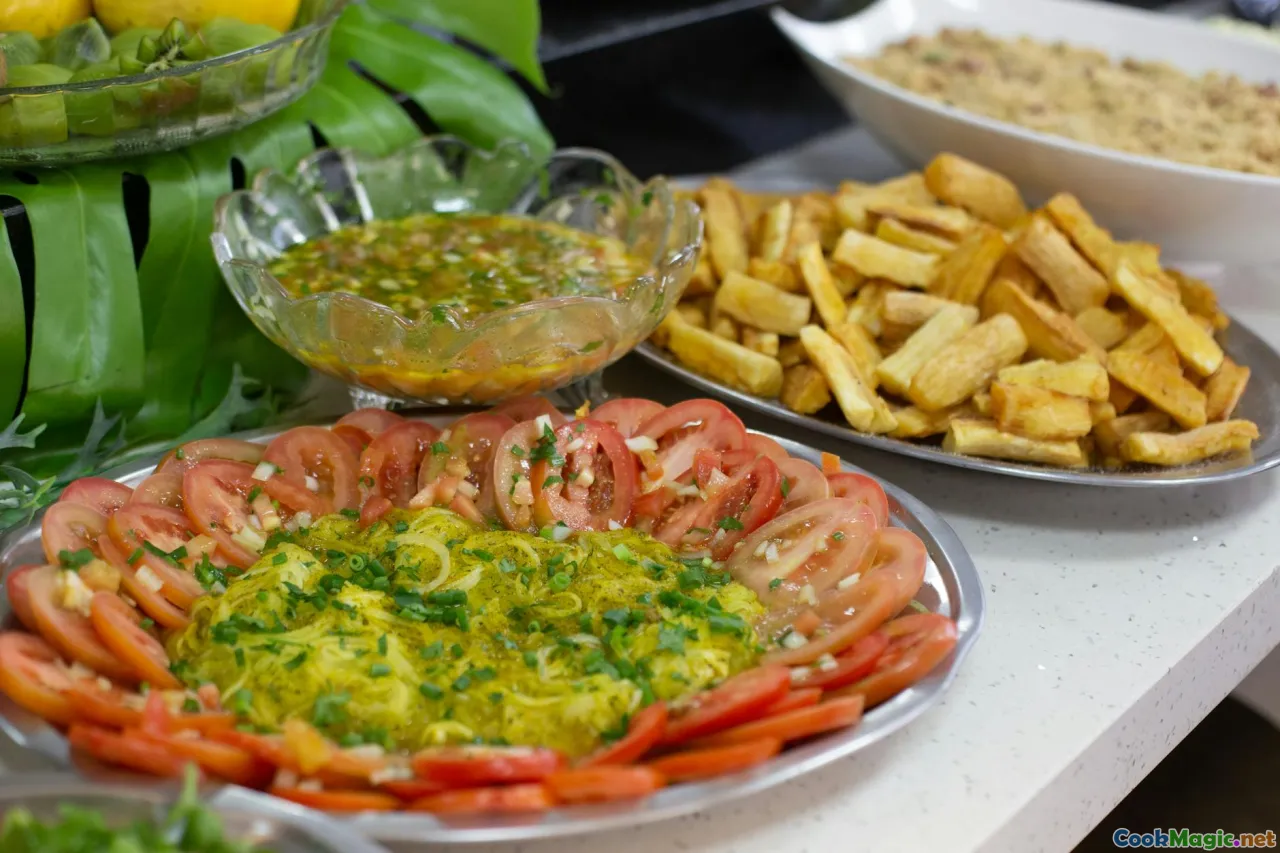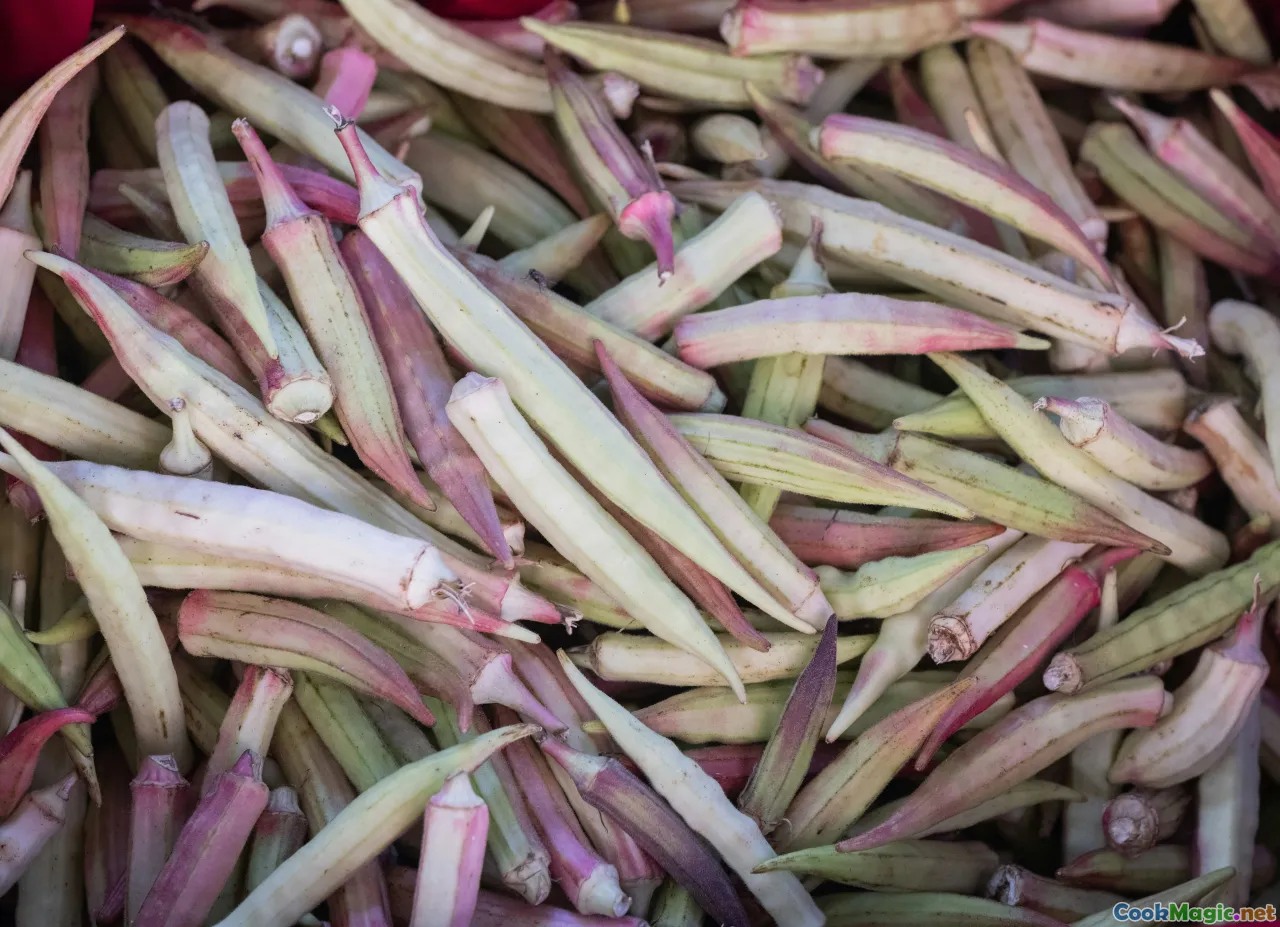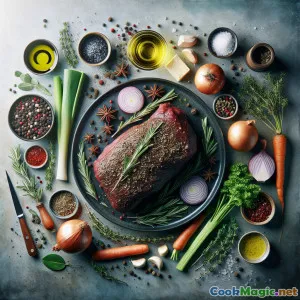
Pita Singkong Miondo: Perayaan Fusi Inggris
(Miondo Cassava Ribbons: A British Fusion Feast)
(0 Ulasan)0
2,300
September 01, 2025
Laporkan Masalah
Bahan
-
800 grams Akar singkong segar
(Peeled and cut into large chunks)
-
1 whole lemon Kulit lemon
(Diparut halus)
-
2 tablespoons Minyak zaitun extra virgin
(Tambahan untuk disiramkan)
-
2 large cloves Siung bawang putih
(Cincang)
-
3 tablespoons Peterseli segar
(Dihaluskan halus)
-
2 tablespoons Daun bawang segar
(Dihaluskan halus)
-
1 teaspoon Garam laut
(Atau sesuai selera)
-
0.5 teaspoon Lada hitam
(Giling segar)
-
100 grams Paprika merah panggang
(Sliced into thin ribbons)
-
1 medium Zucchini
(Sliced very thinly into ribbons)
-
3 tablespoons Biji bunga matahari panggang
(Untuk ditaburkan di atas)
(Peeled and cut into large chunks)
(Diparut halus)
(Tambahan untuk disiramkan)
(Cincang)
(Dihaluskan halus)
(Dihaluskan halus)
(Atau sesuai selera)
(Giling segar)
(Sliced into thin ribbons)
(Sliced very thinly into ribbons)
(Untuk ditaburkan di atas)
Nutrisi
- Porsi: 4
- Ukuran Porsi: 1 generous plate (250g)
- Calories: 350 kcal
- Carbohydrates: 58 g
- Protein: 4 g
- Fat: 11 g
- Fiber: 6 g
- Sugar: 4 g
- Sodium: 625 mg
- Cholesterol: 0 mg
- Calcium: 87 mg
- Iron: 1.2 mg
Instruksi
-
1 - Prep Cassava Ribbons:
Peel the cassava root thoroughly. Using a sharp knife or peeler, slice cassava into long, even ribbons. Place ribbons in a bowl of cold water.
-
2 - Boil Cassava Ribbons:
Bring a large pot of salted water to a boil. Add cassava ribbons and cook for 10-12 min or until just tender. Drain and rinse under cold water to stop cooking.
-
3 - Prepare Flavour Mix:
In a small bowl, combine the lemon zest, olive oil, minced garlic, parsley, and chives. Season with salt and pepper.
-
4 - Roast Veggie Ribbons:
If using, preheat oven to 200°C (400°F). Toss zucchini and red pepper ribbons with olive oil, salt, and pepper. Roast on a tray for 12-15 minutes until just tender and beginning to brown. Set aside.
-
5 - Combine and toss:
Place slightly cooled cassava ribbons in a large bowl. Add the flavour mix and roasted veggie ribbons. Toss gently to coat evenly.
-
6 - Serve and Garnish:
Transfer to serving plates. Sprinkle with toasted sunflower seeds for crunch. Drizzle with extra olive oil and scatter some parsley on top. Serve warm or at room temperature.
Peel the cassava root thoroughly. Using a sharp knife or peeler, slice cassava into long, even ribbons. Place ribbons in a bowl of cold water.
Bring a large pot of salted water to a boil. Add cassava ribbons and cook for 10-12 min or until just tender. Drain and rinse under cold water to stop cooking.
In a small bowl, combine the lemon zest, olive oil, minced garlic, parsley, and chives. Season with salt and pepper.
If using, preheat oven to 200°C (400°F). Toss zucchini and red pepper ribbons with olive oil, salt, and pepper. Roast on a tray for 12-15 minutes until just tender and beginning to brown. Set aside.
Place slightly cooled cassava ribbons in a large bowl. Add the flavour mix and roasted veggie ribbons. Toss gently to coat evenly.
Transfer to serving plates. Sprinkle with toasted sunflower seeds for crunch. Drizzle with extra olive oil and scatter some parsley on top. Serve warm or at room temperature.
Informasi Lebih Lanjut: Pita Singkong Miondo: Perayaan Fusi Inggris
Miondo Cassava Ribbon Feast: A Creative English-Tropical Culinary Fusion
Miondo, or steamed cassava sticks wrapped in banana leaves, is a traditional delicacy celebrated in Cameroon and parts of West Africa. With Miondo Cassava Ribbon Feast, we've reimagined this classic ingredient into something both contemporary and playfully approachable while nodding handsomely toward British cooking sensibilities. Instead of the classic sticks, here you find wafer-thin, silky ribbons of cassava, tossed with bright herbs, olive oil, tangy lemon zest, and (for an optional lively twist) ribbons of roasted vegetables familiar to the English table. The result is both novel but soothingly rustic—a dish that easily spans a spectrum from side salad to stunning vegetarian main.
The Inspiration: From Cameroon to England
Cassava, fondly known as yuca and manioc, is a dietary staple in much of Africa, West Indies, and Latin America. In England, where root vegetables enjoy reverence, cassava has remained less common, shadowed by potatoes and parsnips. Miondo, the Cameroonian treat where steamed smoked cassava dough is shaped into sticks, inspires this festive dish, but instead the showpiece becomes ribbons—soft, undulating, almost pasta-like—married with the zing and simplicity of modern British cuisine. The blending of zesty lemon and earthy roast vegetables speaks to recent English culinary trends, where bold flavors and clean finishes become the heroes.
Preparation Tips and Success Points
Working with fresh cassava demands some care: always peel meticulously to remove all pinkish or brown outer layers that may contain harmful compounds. Thorough boiling and draining are crucial. For the best ribbons, seek chunkier, straighter roots and use a mandolin or robust vegetable peeler. The cooked cassava ribbons should be just tender—not mushy—to retain pleasing bite. Lemon zest, fresh herbs, and the olive oil bring familiar Mediterranean echoes, brightening the starchy root. Roasting your additional vegetables separately helps them keep their own integrity while adding visual vibrancy to the plate.
Ribbons of roasted pepper and charred zucchini nod to the English adoration for seasonal summer vegetables and augment cassava’s earthiness. Don't skip the toasted sunflower seeds: they give texture and nutty flavor that supermarket miondo lacks, rounding out a wholly new experience on the plate.
Cultural Significance and Why Try It
This recipe isn’t just fusion for fusion’s sake; it's the act of culinary exploration at its friendliest. In African households, cassava represents togetherness, grounding, and the sustainability of using easy-to-store staples. English cuisine in the latest era relishes the balance of hearty, simple ingredients and explosive, direct flavors—herbs, garlic, sharp citrus. The union here means the old-world emotional anchor remains but finds itself in new conversation: global, inclusive, and celebratory. It exemplifies the UK’s evolving multicultural table.
Unique Aspects and Personal Thoughts
Unlike starchy English potatoes, cassava possesses a gentle sweetness and chewy resilience. When ribboned and paired with lemon-herb oil, it nearly mimics sophisticated Italian pasta made en Angleterre, but your palate will note something deeper, something soulful: a nod to Africa’s history inside England’s flavor-forward 21st Century kitchens.
If you want to make it entirely vegan, rest assured the base dish remains plant-based as-is; simply avoid dairy garnishes. Meat-eaters can pair the Miondo Cassava Ribbon Feast with herby roast chicken or smoked fish. Ingeniously, leftovers mix into a lunch salad, tasting fantastic even cold.
Ultimately, the Miondo Cassava Ribbon Feast is an edible invitation to transcend boundaries and embrace creativity. Try it with friends and family: let everyone pile ribbons onto their own plates, drizzle, and sprinkle as they wish—just as vibrant, customizable, and joyful as the culinary heritages it brings together.

























